|
|
|
Sort Order |
|
|
|
Items / Page
|
|
|
|
|
|
|
| Srl | Item |
| 1 |
ID:
105935
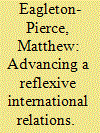

|
|
|
|
|
| Publication |
2011.
|
| Summary/Abstract |
This article advances a call for greater reflexivity in International Relations (IR) to uncover various intellectual and political biases that may obscure the research process. Inspired by existing reflexive practices in IR and, in particular, Pierre Bourdieu's use of such a method, it argues that reflexivity matters for enhancing ethically grounded research, in terms of not only the choice of subjects to study, but also how specific problems are treated, and hence what kind of results can be expected. However, the argument also goes beyond the appeal to autobiographical reflexivity to embrace other dimensions. This includes attention to institutional forces that shape the agency of the scholar and, in turn, the complex relationship between the academy and the wider political world. In the most ambitious sense, the potential for reflexivity can also be conceived collectively in terms of activist intellectuals who seek to reward reflexive practices through dialogue and political intervention. The social space of international trade politics is taken as an empirical example.
|
|
|
|
|
|
|
|
|
|
|
|
|
|
|
|
| 2 |
ID:
105932
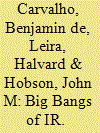

|
|
|
|
|
| Publication |
2011.
|
| Summary/Abstract |
International relations as we know them emerged through the peace of Westphalia, and the discipline of International Relations emerged in 1919 and developed through a First Great Debate between idealists and realists. These are the established myths of 1648 and 1919. In this article we demonstrate how historical and historiographical scholarship has demolished these myths, but that the myths regardless are pervasive in the current textbooks that are used in teaching future IR scholars. Disciplinary dialogue seems to have failed completely. Based on a detailed reading of the myths and their perpetuation, we discuss the consequences of the discipline's reliance on mythical origins, why there has been so little incorporation of revisionist insight and what possibilities there are for enhancing the dialogue.
|
|
|
|
|
|
|
|
|
|
|
|
|
|
|
|
| 3 |
ID:
105931
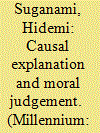

|
|
|
|
|
| Publication |
2011.
|
| Summary/Abstract |
By combining arguments about causal explanation in history found in the writings of Veyne and Dray, this article discusses one plausible line of reasoning which suggests that there is a type of causal explanation which historians offer to which their moral judgements are conceptually integral. It assesses the validity of this line of thinking and suggests that the reason why, in some cases, our moral judgements seep through to our causal explanations is not that certain concepts, such as, in particular, passivity and activity of the key actors' acts, used in our causal narratives, necessarily involve moral judgements for their application, but rather that any explanation is an answer to a question and some causal questions turn out to be, or may plausibly be construed as, asking for our moral views. The 'intrusion' of moral judgement into causal explanation is not logically necessary, but may be contextually appropriate in some cases.
|
|
|
|
|
|
|
|
|
|
|
|
|
|
|
|
| 4 |
ID:
105924
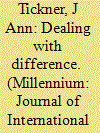

|
|
|
|
|
| Publication |
2011.
|
| Summary/Abstract |
This address suggests some avenues through which IR scholars from a variety of methodological approaches and different geographical locations might better dialogue with each other in mutually respectful ways. It begins by briefly revisiting IR's great debates since they represent the way the discipline has traditionally defined itself. It claims that these debates have centred on challenging the predominance of a US-centred discipline and its commitment to neo-positivist methodologies. Drawing on postcolonial and feminist literatures, it then offers some suggestions as to how might envisage an IR that is built on more global foundations and on a more pluralist understanding of what we define as scientific knowledge. It concludes with some thoughts on possible paths towards placing different scientific traditions on a more equal and mutually respectful footing.
|
|
|
|
|
|
|
|
|
|
|
|
|
|
|
|
| 5 |
ID:
105927


|
|
|
|
|
| Publication |
2011.
|
| Summary/Abstract |
In this article I seek to decolonise the grounding of dialogue within the Europe-modern condition. I do so by working through two authors who are indispensable to the current canon of IR theory, Immanuel Kant and Michel Foucault, and one author who is largely missing from the canon, Édouard Glissant, the Martiniquean poet and literary critique. With regards to Kant and Foucault, I show how within both there exists at the same time a strong endorsement of the policing of ethical inquiry on the grounds of the European-modern and a weaker resistance to it. With regards to Glissant, I focus on his set of essays entitled Caribbean Discourse to show how he strongly endorses a relational pluralising of the grounds of ethical inquiry while at the same time retaining a weaker accommodation to the European-modern. In the course of these discussions I present each author's assessment of an adequate ethical faculty in the form of a figure: in Kant, the enlightened philosopher; in Foucault, the creative work of art; and in Glissant, the maroon. In the final section I rehearse a dialogue amongst the three figures that opens up the grounds of ethical inquiry to decolonising impulses.
|
|
|
|
|
|
|
|
|
|
|
|
|
|
|
|
| 6 |
ID:
105925
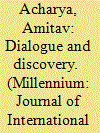

|
|
|
|
|
| Publication |
2011.
|
| Summary/Abstract |
Scholars of International Relations (IR) increasingly realise that their discipline, including its theories and methods, often neglects voices and experiences outside of the West. But how do we address this problem and move the discipline forward? While some question whether 'Western' and 'non-Western' (or 'post-Western') are useful labels, there are also other perspectives, including those who believe in the adequacy of existing theories and approaches, those who argue for particular national 'schools' of IR, and those who dismiss recent efforts to broaden IR theory as 'mimicry' in terms of their epistemological underpinnings. After reviewing these debates, this article identifies some avenues for further research with a view to bringing out the global heritage of IR. These include, among other things, paying greater attention to the genealogy of international systems, the diversity of regionalisms and regional worlds, the integration of area studies with IR, people-centric approaches to IR, security and development, and the agency role of non-Western ideas and actors in building global order. I also argue for broadening the epistemology of IR theory with the help of non-Western philosophies such as Buddhism. While the study of IR remains dominated by Western perspectives and contributions, it is possible to build different and alternative theories which originate from non-Western contexts and experiences.
|
|
|
|
|
|
|
|
|
|
|
|
|
|
|
|
| 7 |
ID:
105926
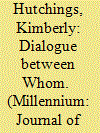

|
|
|
|
|
| Publication |
2011.
|
| Summary/Abstract |
There is a politics to the West/non-West distinction that is bound up with predominant models for dialogue in IR; rethinking these models of dialogue implies a new politics, and therefore also, I will suggest, a move away from the West/non-West binary as a way of characterising the participants in dialogic exchange oriented towards the expansive transformation of disciplinary imaginaries.
|
|
|
|
|
|
|
|
|
|
|
|
|
|
|
|
| 8 |
ID:
105930
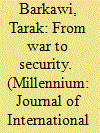

|
|
|
| 9 |
ID:
105933


|
|
|
|
|
| Publication |
2011.
|
| Summary/Abstract |
In this article I want to put forward an intellectual defence of the political discourse of dialogue of civilisations by challenging the idea that 'civilisation-based thinking' is necessarily a conflict-generating factor and arguing that, contrary to fashionable assumptions, a civilisational dialogue that wants to contribute to a more peaceful world order requires, in a qualified way, 'stronger' civilisational identities. In particular, I take issue with the academic criticisms to dialogue of civilisations coming from the camp of the critique of the clash of civilisations and well represented by Amartya Sen's explicit and Edward Said's more indirect critiques to 'civilisation-based thinking': by unveiling their implicit endorsement of the Westphalian/secularist presumption, I will show the counter-intuitive political implications of a dialogue among 'strong' civilisational identities and traditions when framed hermeneutically as 'fusion of horizons'. Finally I provide a supplementary brief illustration to my defence of dialogue of civilisations by criticising Said's reading of Louis Massignon - the great 20th century French scholar of Islam - as part of Orientalism and suggesting that 'in diverging agreement' with Said, Massignon's work and life stand as a very concrete proof of the possibility of a 'dialogue of civilisations' that escapes the yoke of the Orientalist accusations.
|
|
|
|
|
|
|
|
|
|
|
|
|
|
|
|
| 10 |
ID:
105934
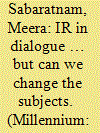

|
|
|
|
|
| Publication |
2011.
|
| Summary/Abstract |
In an effort to reconceive the conduct of 'dialogue' within world politics, it is necessary for us to find new subject-positions from which to speak. This article develops a typology of six distinctive intellectual strategies through which 'decolonising' approaches to social theory can help rethink world politics by bringing alternative 'subjects' of inquiry into being. These strategies include pointing out discursive Orientalisms, deconstructing historical myths of European development, challenging Eurocentric historiographies, rearticulating subaltern subjectivities, diversifying political subjecthoods and re-imagining the social-psychological subject of world politics. The value of articulating the project in this way is illustrated in relation to a specific research project on the politics of the liberal peace in Mozambique. The article discusses a number of tensions arising from engaging with plurality and difference as a basis for conducting social inquiry, as well as some structural problems in the profession that inhibit carrying out this kind of research.
|
|
|
|
|
|
|
|
|
|
|
|
|
|
|
|
| 11 |
ID:
105937
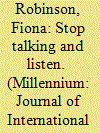

|
|
|
|
|
| Publication |
2011.
|
| Summary/Abstract |
This article seeks to extend feminist critiques of Habermasian discourse ethics in International Relations by engaging with the feminist ethics of care. Using the work of Andrew Linklater as a starting point, it argues that neither the existing critiques nor the responses have adequately addressed the key features of care ethics. The article critiques the idea of ethics as dialogue among 'human beings as equals' through an elaboration of several features of the ethics of care: firstly, the importance in care ethics of 'dependency' and 'vulnerability' not as conditions to be overcome, but rather as ways of being for normal human subjects; secondly, the focus on the responsibilities for listening attentively to the voices of others rather than on rights of individuals to be included in dialogue; thirdly, the need for patience and commitment in the recognition that responsibilities to others are fulfilled over the long, rather than the short, term; and, finally, the idea of care ethics as a substantive, democratic ethic of responsibility. These arguments emerge out of the basic ideas of care ethics - that relations and responsibilities of care are central to human life, and that care is a public value that must be negotiated at a variety of levels, from the household to the international community.
|
|
|
|
|
|
|
|
|
|
|
|
|
|
|
|
| 12 |
ID:
105928


|
|
|
|
|
| Publication |
2011.
|
| Summary/Abstract |
Historical sociology is divided between two broad approaches, Weberian and Marxist. The first utilises a methodology of ideal types, presenting a largely endogenous examination of Western history in its account of modernity. The second acknowledges capitalism as a 'world system', but also identifies its central dynamic with processes having a European origin. Within the Weberian tradition, theories of multiple modernities allow modernity to be understood as culturally inflected and diverse in its instantiations, but retain the idea of a distinctive European modernity against which other forms are measured. Similarly, within Marxism, the emphasis on a distinctive capitalist mode of production allows space for uneven development globally, or the contingent association of non-capitalist forms, but retains an account of the logic of capitalism derived from European experience. Although the social relations of colonialism, imperialism and slavery are coextensive with capitalism, each tradition renders them peripheral to the development of capitalist modernity. This article discusses the limitations of the two approaches, arguing that any model that posits a world historical centre from which developments diffuse outwards is problematic, especially when such a model does not address the 'others' with which it comes subsequently to engage. What is needed is a 'connected histories' approach counter to the otherwise dominant forms of historical sociology.
|
|
|
|
|
|
|
|
|
|
|
|
|
|
|
|
| 13 |
ID:
105936


|
|
|
|
|
| Publication |
2011.
|
| Summary/Abstract |
With reference to Martin Buber's dialogical philosophy, the article identifies three dialogic imperatives that burden IR scholars. The first imperative is internal to the scholar. It is the intrapersonal imperative to conduct a dialogue with and in herself/himself. The second dialogic imperative is the interpersonal dialogue, which helps to establish a community of scholars. The third dialogic imperative is external to the community of scholars. It is the obligation to dialogically engage with the public to which the scholars belong. It will be shown that the third dialogic imperative is also a dialogic imperative to engage with truth about the public, that is, with social reality. I will end the article with a brief discussion on the Buberian dialogue within the context of the Israeli-Palestinian conflict.
|
|
|
|
|
|
|
|
|
|
|
|
|
|
|
|
| 14 |
ID:
105938
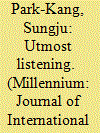

|
|
|
|
|
| Publication |
2011.
|
| Summary/Abstract |
This article attempts to problematise the conventional notion of dialogue, proposing 'utmost listening' as an alternative approach in International Relations (IR) dialogue. More specifically, I argue that we need to regard IR as a foreign language; I particularly explore the proposed approach in terms of feminist IR. Having a dialogue as a 'non-native' speaker demands hard work and consistent training. Most of all, a starting point would be to listen carefully to dialogue partners. This is different from the conventional approach in dialogue which presupposes that listening and speaking are situated almost equally in epistemological terms. In this sense, I reflect on myself as a 'provisional-straight man' researcher who engages with feminist IR. I also consider other men scholars, such as Robert Keohane. Finally, I introduce Momo - a fictional character in Michael Ende's novel - as an 'utmost listener'. What happens if we follow Momo in the IR community?
|
|
|
|
|
|
|
|
|
|
|
|
|
|
|
|
| 15 |
ID:
105929
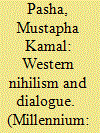

|
|
|
|
|
| Publication |
2011.
|
| Summary/Abstract |
Recognition of other cultural mappings and sensitivities can facilitate meaningful dialogue in International Relations. On this assurance, the naturalised history of the discipline becomes more susceptible to rival accounts that materialise in other locales. Limits to dialogue, however, are internal to International Relations, a product of particular histories and settlements. This article probes some of the limits imposed by the spectres of nihilism on International Relations as theory and practice. These limits originate principally from the repudiation of Transcendence and the collapse of Western metaphysics as well as the imposition of a framework of 'post-politics' drawn from reading obituaries of the death of the liberal modern Western subject worldwide.
|
|
|
|
|
|
|
|
|
|
|
|
|
|
|
|
|
|
|
|
|